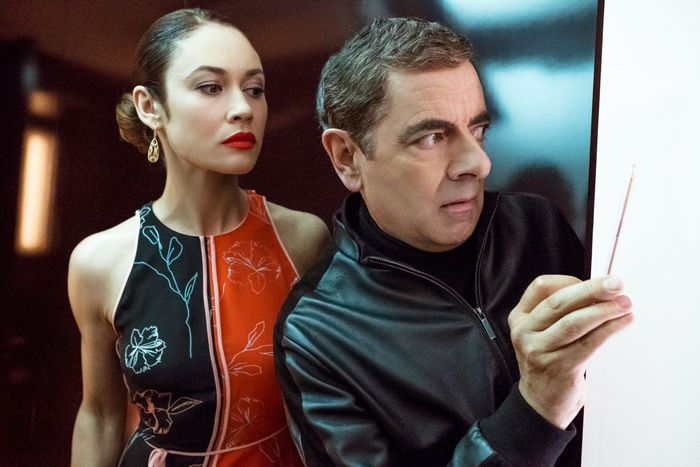
“Mr. Bean is Great Britain trying to come to terms with the modern world,” declared a very smart friend of mine back in 1994, discussing one of Rowan Atkinson’s more popular characters. It was a brilliant observation, but such specificity had never occurred to me. The English comedian’s shtick seemed so universal; people around the world could connect to his humor. But my pal was right, and I hope his ears were ringing as I watched Johnny English Strikes Again, as it’s the clearest distillation yet of this notion of Atkinson as England’s last befuddled bulwark against modernity.
In this new film, the klutzy and long-retired secret agent is brought back into service when every other British spy has his or her cover blown thanks to a worldwide computer worm. As the mysterious hackers continue to strike Britain’s tech infrastructure — messing with trains, traffic, and everything else — English is entrusted to find out who’s doing the hacking, and stop them. Hard-drinking Prime Minister Emma Thompson wants the situation handled soon, for she’s not only about to host the G12 summit, she’s also trying to strike a deal with hotshot American tech billionaire Jason Volta (Jake Lacy), who just so happens to have visions of creating “an algorithm for an entire country.” He wants Britain to hand over all its data to him so he can make everything run more smoothly, and also profit handsomely.
You can probably guess where this is headed. The plot is obvious, but that’s kind of the point here: English is the one person who can’t quite get a grasp on what’s going on around him. And the setup isn’t without its relevant bits. Our hero is naturally suspicious of modern technology, which puts him at odds with the new, digital secret service, where the clever, old-fashioned gadgets and weapons have been replaced with apps and smartphones, and the cool cars replaced with a fleet of boring, ecofriendly hybrids. (When he insists on a gun, he’s reluctantly given one — and promptly read a required lengthy legal disclaimer and a health advisory about cashew oil.) English does find one old red Aston Martin he can use. From behind its wheel, he gloats that since it has no satellite navigation or microchips, it’s pretty much undetectable. And then he revs it up, and the car’s roaring VRROOOM VRROOOM suggests that, well, it might be rather detectable after all.
The film doesn’t offer many huge belly laughs — Atkinson has never been one for big comic climaxes — but it does deliver a fairly steady stream of pleasant chuckles, many of them mixed with generous doses of humiliation comedy. As with most classic slapstick heroes, English is both the butt of and hero of all the film’s jokes, and we cringe along with his ineptitude. Posing as a waiter in the South of France, he sets an entire restaurant on fire. Testing out a new VR walk-through of a bad guy’s lair, he unwittingly wanders into traffic and terrorizes a tour bus. The film’s finale has him slowly and awkwardly stomping around in an actual knight’s suit of armor, as he tries to battle the high-tech, tablet-wielding villains. You kind of have to admire such heavy-handed symbolism.
Johnny English Strikes Again was always destined to be an afterthought, regardless of quality, but it is still a bit frustrating that the film isn’t sharper, or funnier. In his heyday, Atkinson seemed like the last gasp of a tradition of funny men reaching back to Jacques Tati and Buster Keaton and Charlie Chaplin: the hapless innocent at odds with a complex world. That’s a universal feeling, and it hasn’t gone away — if anything, more of us feel more lost than ever before. This new film will pass the time, but imagine if it had actually been good.


